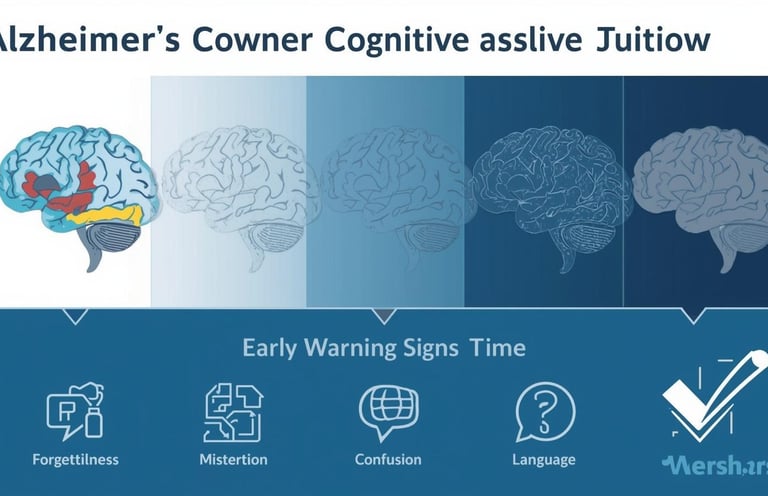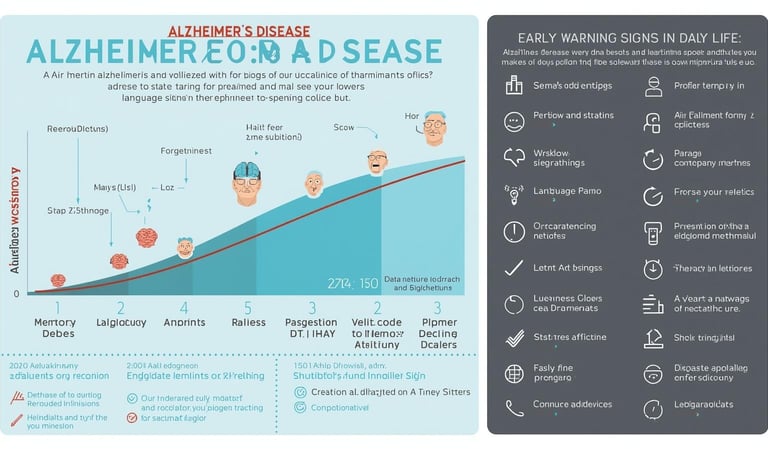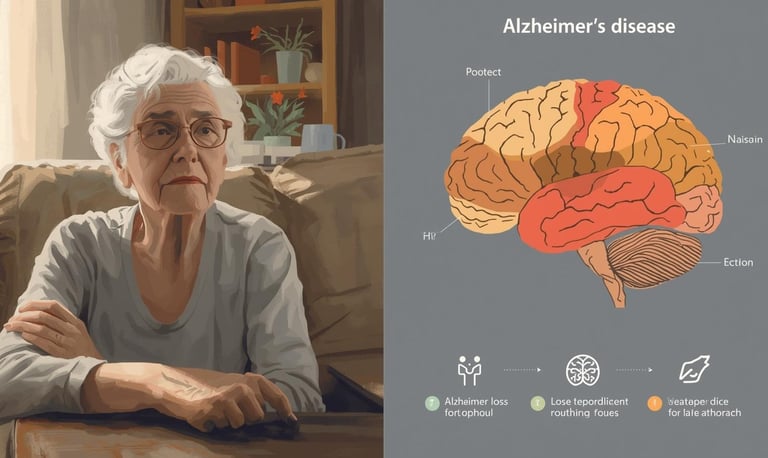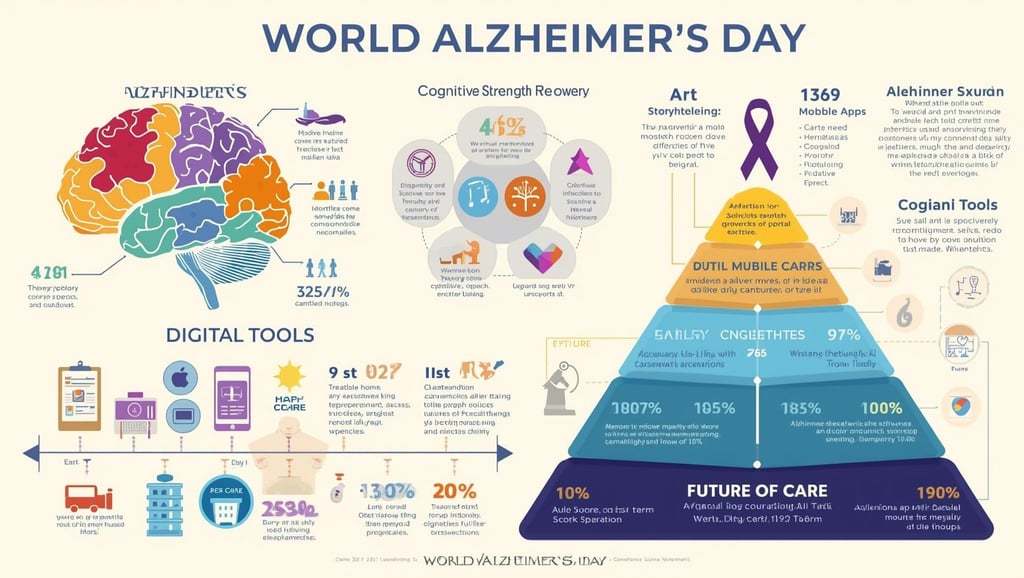Understanding Alzheimer’s: Cognitive Effects and Early Signs
Alzheimer’s cognitive impact, dementia symptoms, early detection. Part 1
Gajanan L. Bhonde
9/21/202510 min read


The Future of Alzheimer’s Care: From Awareness to Digital Transformation
By My Digi Behaviour Editorial Desk
World Alzheimer’s Day: A Call for Awareness
Every year, World Alzheimer’s Day reminds us of the urgency to understand, address, and overcome one of the most pressing health challenges of our time. Alzheimer’s is more than memory loss—it is a condition that reshapes families, societies, and futures. As awareness spreads, so does the hope that innovative solutions can improve the lives of millions.
🧠 The Cognitive Impact of Alzheimer’s
Alzheimer’s slowly disrupts the brain’s ability to store and process memories. Beyond forgetting names and places, patients struggle with attention, decision-making, and language. These cognitive disruptions can lead to:
Memory Gaps that fragment personal identity.
Reduced Problem-Solving Skills, affecting daily independence.
Emotional Imbalance, increasing anxiety and depression.
Case Study: A retired teacher from Pune described her early symptoms as “losing pieces of herself, one memory at a time.” Such stories underline why cognitive awareness is crucial for early detection.
💡 Recovering Cognitive Strength
Although Alzheimer’s has no cure, recovery of cognitive strength is possible through:
Daily Brain Exercises: Crossword puzzles, memory games, and storytelling.
Music Therapy: Songs stimulate emotional memory even in late stages.
Routine & Structure: Consistent daily schedules reduce confusion.
Real-life example: A Bengaluru-based NGO runs “Memory Cafés” where patients engage in art, music, and storytelling—helping restore dignity and joy in small yet powerful ways.
📱 Digital Technology: A Game-Changer in Alzheimer’s Care
Digital innovations are transforming Alzheimer’s care from reactive to proactive:
Mobile Apps like CogniFit and Lumosity enhance memory with structured exercises.
VR Therapy recreates familiar environments, helping patients reconnect with old memories.
Telehealth Platforms allow caregivers and doctors to monitor patients remotely.
Wearables track sleep, activity, and stress levels, alerting families to sudden changes.
Example: Johns Hopkins Public Health notes that smartwatches can now detect irregular sleep cycles linked with cognitive decline, prompting early interventions.
🔮 The Future of Digital Alzheimer’s Care
As technology advances, the future of Alzheimer’s care looks promising:
Personalized Treatment: AI-driven algorithms will design care plans tailored to each patient’s unique brain profile. (Appventurez)
Advanced Monitoring: Wearable devices will collect real-time health data, alerting caregivers to risks before crises occur. (Johns Hopkins Public Health)
Enhanced Accessibility: Affordable apps and tools will bring digital care to rural and underserved communities. (Alzheimer’s Association)
🌍 A Message of Hope
The fight against Alzheimer’s is not only about science—it’s about humanity. With greater awareness, compassionate caregiving, and digital innovation, we can turn despair into dignity, and fear into future readiness.
As families, communities, and nations, we must embrace both traditional care and digital tools to ensure that Alzheimer’s patients live with respect, connection, and joy.
Defining Alzheimer’s and Dementia
Alzheimer’s disease is a specific form of dementia, which is a broader term encompassing a range of cognitive impairments that interfere with daily life and functioning. Dementia itself is not a single disease; rather, it is a syndrome characterized by a decline in mental function, which affects memory, thinking, and social abilities. While various types of dementia are recognized, Alzheimer’s disease accounts for the majority of cases, comprising approximately 60 to 80 percent of diagnosed dementia cases globally.
As an irreversible and progressive brain disorder, Alzheimer’s is distinguished by its unique pathology, which includes the accumulation of amyloid plaques and tau tangles within the brain. This pathological progression leads to a gradual decline in cognitive abilities, ultimately affecting the individual's ability to perform everyday tasks. Unlike other types of dementia, such as vascular dementia or Lewy body dementia, Alzheimer’s typically progresses through a series of stages—from mild cognitive impairment to severe memory loss and dependency on caregivers.
Statistics reveal that Alzheimer’s is becoming increasingly prevalent, particularly among aging populations. In the United States alone, an estimated 6.5 million individuals over the age of 65 are living with Alzheimer’s, and this number is expected to rise significantly in the coming decades. This increase in prevalence highlights the urgent need for awareness and understanding of Alzheimer’s and its implications not only for those directly affected but also for families and healthcare systems dealing with its effects.
By delineating Alzheimer’s disease from the broader category of dementia, it becomes evident that while all individuals living with Alzheimer’s have dementia, not all dementia patients have Alzheimer’s. This distinction is crucial for proper diagnosis, treatment, and management of cognitive health issues.
Cognitive Impacts of Alzheimer’s Disease
Alzheimer’s disease, a progressive neurological disorder, has profound cognitive effects that significantly impair an individual's ability to function optimally in daily life. One of the hallmark symptoms associated with Alzheimer’s is memory loss. As the disease advances, individuals often struggle to recall recent events, while their long-term memories may also be affected. This occurs due to the deterioration of brain cells, particularly in areas responsible for memory formation, such as the hippocampus.
Another cognitive challenge that emerges in individuals with Alzheimer’s is a decline in attention. Patients may find it increasingly difficult to focus on tasks or conversations, which can lead to frustration or feelings of inadequacy. Scientific studies indicate that Alzheimer’s disrupts the neural networks involved in attention regulation, resulting in lapses in concentration. This cognitive decline not only affects personal relationships but also complicates daily responsibilities.
Furthermore, impaired problem-solving abilities are a significant concern in those living with Alzheimer’s disease. As abstract thinking processes weaken, individuals may struggle to formulate solutions to everyday challenges, such as planning a meal or managing finances. This signifies a breakdown in critical reasoning faculties due to the atrophy of neurons in brain regions tasked with high-level cognitive functioning. Practical examples highlight how simple tasks may become daunting, creating a sense of dependency on caregivers or family members.
Despite the cognitive impairments associated with Alzheimer’s, understanding the nuances of these effects can encourage early detection and intervention. By recognizing signs such as memory lapses, difficulty sustaining attention, and challenges with problem-solving, individuals can seek timely medical advice. This proactive approach is crucial for implementing strategies that can help manage symptoms and improve the quality of life for those affected.
Recognizing Early Warning Signs
Identifying the early warning signs of Alzheimer’s is crucial for timely intervention and support. These signs may manifest subtly and can impact daily life in various ways. One common indication is memory lapses, such as frequently misplacing items or forgetting recent conversations. For instance, an individual might struggle to recall where they placed their keys or may need repeated prompts to remember plans made just a few hours prior. These lapses can be mistaken for typical aging; however, when they occur alongside other symptoms, they can be a cause for concern.
Another warning sign is changes in mood and personality. A person may exhibit increased confusion, anxiety, or irritability, becoming withdrawn from social interactions they once enjoyed. For example, someone who was once outgoing may start avoiding gatherings or may react unusually, displaying frustration over minor issues. This change can lead to social isolation, which further exacerbates cognitive decline.
Moreover, difficulties with familiar tasks often emerge as an early warning sign of Alzheimer’s. Individuals may find themselves struggling to complete routine activities they once performed effortlessly, such as cooking favorite recipes or managing finances. For example, an elderly parent might forget how to operate a familiar kitchen appliance, such as the microwave, or may become confused while following a recipe they have used for years.
Lastly, those experiencing subtle issues with language may also be showing early signs of cognitive decline. This can include struggling to find the right words during conversations or repeating oneself frequently. An example of this is when a loved one can no longer recall the name of a common object, such as a "chair," opting instead to describe it in a roundabout way. Recognizing these early indicators can empower individuals and families to seek medical advice promptly, potentially allowing for better management of the condition.
The Importance of Awareness and Early Detection
Awareness and early detection of Alzheimer's disease are crucial in managing the cognitive decline associated with this condition. Recognizing the initial signs can lead to timely interventions that significantly alter the course of the illness. Studies indicate that when Alzheimer's is diagnosed in its early stages, individuals have a better chance of maintaining their quality of life for a more extended period. Furthermore, early detection facilitates more effective management of symptoms, allowing caregivers and medical professionals to implement tailored strategies suited to the individual's needs.
One of the most notable benefits of early detection is the ability to plan for the future. An Alzheimer's diagnosis brings forth numerous questions regarding care, finances, and legal issues. By identifying the disease early, individuals and families can engage in proactive discussions about advanced care planning, ensuring that preferences and wishes are respected. This foresight is invaluable, as it alleviates some of the stress associated with caregiving and decision-making later in the disease progression.
Moreover, increasing awareness about Alzheimer's can have profound societal implications. As communities become more knowledgeable about the symptoms and risks associated with cognitive decline, they become equipped to offer support and resources to those affected. Enhanced awareness leads to a culture of understanding and compassion, reducing stigma surrounding the disease. This societal shift fosters environments where individuals feel comfortable seeking help and discussing their concerns without fear of judgment.
In summary, the importance of awareness and early detection of Alzheimer's cannot be overstated. By recognizing early signs and understanding the profound implications of a timely diagnosis, individuals, caregivers, and communities can collaborate to enhance the quality of life for those affected by this debilitating disease.
Impact on Family and Caregivers
Alzheimer's disease exerts a significant toll not only on those diagnosed but also on their families and caregivers. The emotional weight of witnessing a loved one’s cognitive decline can lead to feelings of grief, sadness, and helplessness. Family members may experience anticipatory grief even before the patient reaches advanced stages, as they grapple with the gradual loss of their loved one's identity and capabilities. This emotional burden can result in strained relationships, increased anxiety, and overall stress within the family unit.
Furthermore, the financial implications associated with Alzheimer's care can be overwhelming. The costs involved in managing the disease—including medical bills, caregiving services, and potential modifications to living spaces—frequently accumulate, placing additional pressure on family resources. Many caregivers find themselves balancing paid employment and caregiving responsibilities, leading to uncertainty in job stability and long-term financial security.
Social challenges also arise, as caregivers may isolate themselves due to the demanding nature of their responsibility. Friends and extended family members may inadvertently withdraw, either due to discomfort with the situation or misunderstandings about the disease. This isolation can exacerbate feelings of loneliness and depression among caregivers, further diminishing their well-being.
Recognizing the multifaceted impact of Alzheimer’s on families emphasizes the importance of support systems and community resources. Both formal and informal networks can provide assistance and respite for caregivers, enabling them to sustain their health while navigating the complexities of caregiving. Access to support groups, educational programs, and respite care can alleviate some challenges faced by families, allowing for better management of emotional, financial, and social stresses inherent in dementia care.
Available Support and Resources
Understanding Alzheimer’s disease is crucial not only for those diagnosed but also for their families and caregivers. A variety of resources and support systems are available to assist individuals affected by Alzheimer’s. Both local and national organizations offer invaluable services that cater to the diverse needs of patients and their loved ones.
National organizations such as the Alzheimer’s Association and the Alzheimer’s Foundation of America provide a wealth of resources, from educational materials about Alzheimer's symptoms to guidance on navigating care plans. These organizations operate helplines, where families can seek immediate counsel from trained professionals who can help them understand the progression of the disease, as well as navigate the emotional challenges it presents.
Local support groups are another vital resource, offering a platform for those affected by Alzheimer’s to connect with others in similar situations. These groups often meet regularly and are facilitated by professionals who ensure a safe environment for sharing experiences and feelings. Participants can glean insights and coping strategies from one another, fostering a sense of community and understanding.
For those seeking professional guidance, it is advisable to consult healthcare providers specializing in memory disorders. They can recommend tailored resources, including cognitive therapies and clinical trials, that may benefit patients. Additionally, local chapters of national organizations often provide educational workshops that can enhance understanding of Alzheimer’s and its caregiving aspects.
In summary, whether through national resources or community support, individuals and families impacted by Alzheimer’s have various avenues for assistance. Identifying and utilizing these resources can significantly enhance the caregiving experience and provide crucial emotional and practical help along the journey. Seeking out these supports early can lead to more informed caregiving and better outcomes for those affected.
Conclusion: Empowering Knowledge and Action
Understanding Alzheimer’s is a crucial step toward managing its impact on individuals and families. Throughout this discussion, we have explored the cognitive effects often associated with this progressive condition, including memory loss, difficulties in problem-solving, and changes in social interactions. Recognizing these early signs is vital, as timely diagnosis can significantly affect the quality of life for both those living with Alzheimer’s and their caregivers.
The consequences of a late diagnosis can be profound, leading to increased confusion, frustration, and a greater challenge in accessing supportive care. Knowledge is empowering; by educating ourselves and others about Alzheimer’s, we can foster a more supportive environment for those affected. It is essential to communicate openly about memory changes with healthcare professionals and to advocate for individuals experiencing these symptoms.
Moreover, community awareness plays an instrumental role in combating misinformation and stigma surrounding Alzheimer’s disease. Engaging in discussions, supporting local Alzheimer’s organizations, and participating in awareness campaigns can help build a stronger network of support for those in need. Staying informed about recent research, potential treatments, and coping strategies will equip individuals with tools to navigate the complexities associated with Alzheimer's.
In conclusion, understanding Alzheimer’s is not merely an academic exercise; it is a call to action. By recognizing the cognitive changes and early signs of this disease, we not only protect ourselves but also advocate for others. Encourage conversations, share information, and foster understanding in your community. Together, we can cultivate an informed society equipped to face the challenges associated with Alzheimer’s, ultimately leading to enhanced quality of life for all those affected.














